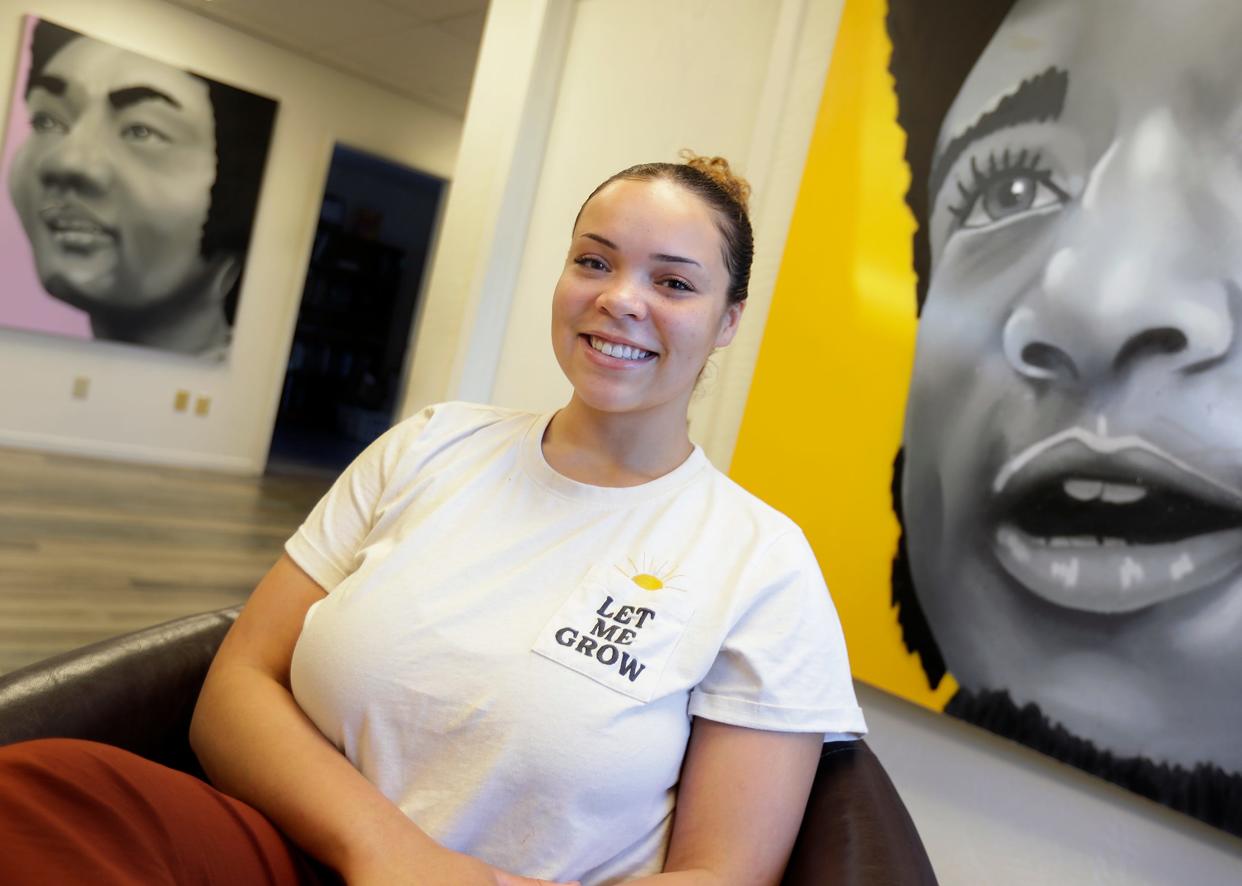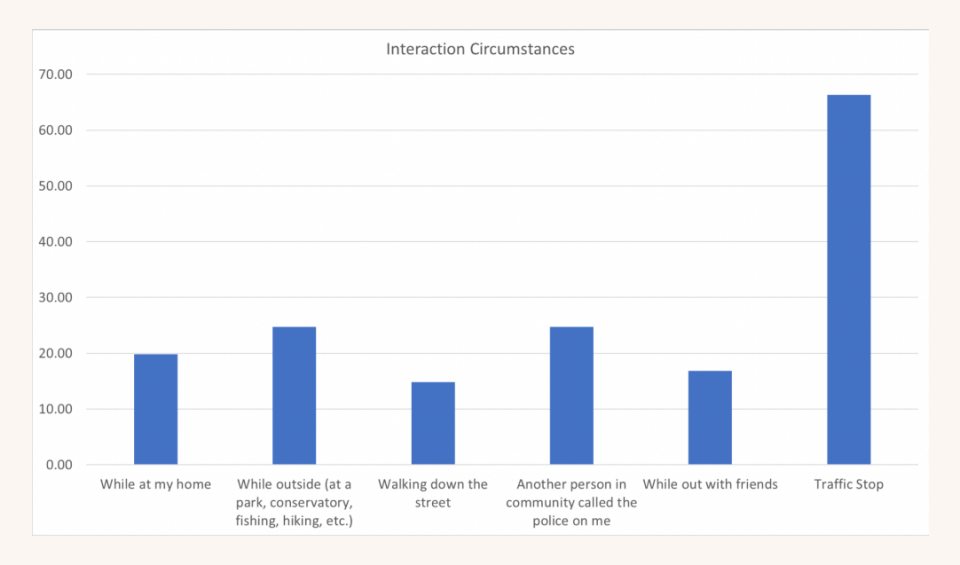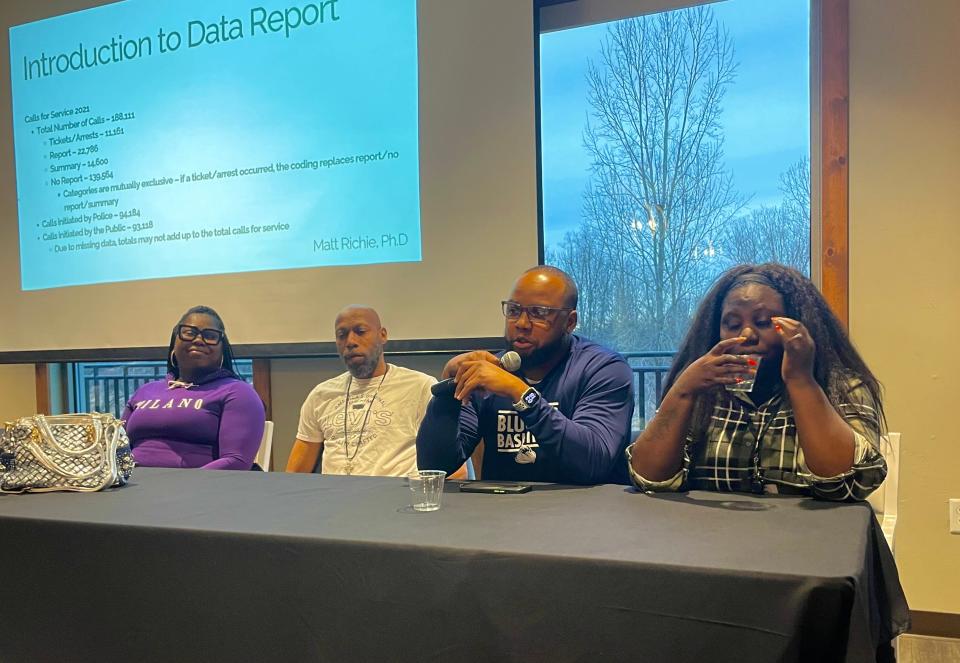New study shows lack of trust between Black residents and police. Local nonprofit wants to fix that.

APPLETON - Nearly 40% of Black residents in the Fox Valley don't feel safe around police, according to new data from the Black-led advocacy group People of Progression.
These findings were released Dec. 1 at Bubolz Nature Preserve to conclude People of Progression's research project aimed at understanding why Black residents are more frequently targeted by Outagamie County law enforcement.
Over the past nine months, the group spoke with 101 Black residents on their interactions with officers in the county and took a deep dive into law enforcement data to get at the heart of the problem.
People of Progression's project was one of 25 nationwide as part of the Catalyst Grant Program, a collaboration between the Urban Institute and the Microsoft Justice Reform Initiative that provides recipients with funding, data and technology to advance racial equity in the criminal legal system.
After surveying negative experiences Black residents have had with Outagamie County law enforcement, the group hopes to use its findings to improve relationships and trust between the two.
“We want to build better relationships between police and residents so that residents are less fearful of police and police aren’t fearful of residents,” People of Progression Executive Director Kristen Gondek told The Post-Crescent.
People of Progression's project looked at interactions between law enforcement and Black residents
The project came forth after a 2021 study by University of Wisconsin-Oshkosh criminal justice assistant professor Matt Richie found Black people account for 17.5% of the Outagamie County Jail's population, despite making up 1% of the county population.
To understand why there is a high percentage of Black county jail inmates, People of Progression collaborated with Richie and Lawrence University professor of ethnic studies Jesús Smith to see what's going on before someone is booked.
Faith Roska, systems advocate for People of Progression, spearheaded the project by surveying Black residents' thoughts and experiences with local law enforcement.
“We wanted to do some temperature checks on what the Black individuals that we surveyed felt about police departments,” Roska said.
The group then cross-referenced residents’ experiences with almost 200,000 calls for services collected from every law enforcement agency in the county in 2021.
Specifically, the project looked at calls to inspect “suspicious behavior” made by the public.
For many people of color, Richie said, their first interaction with police can be when police are responding to suspicious behavior calls for what is often harmless behavior, which makes people of color feel targeted in their own neighborhood.
Research shows lack of trust between Black residents and police
From surveying Black residents, the group found a common thread of a general lack of trust between Black people and the police.
Survey results show less than 10% of Black residents agreed police contribute to the safety of marginalized groups in the county. And nearly half of participants said they don't believe Outagamie County is welcoming to people of color.
Community advocate for People of Progression Kimberly Huddleston said she moved her four sons to Menasha from Chicago for a better life, but that hasn't been the case due to some interactions with police.
"My son has PTSD and every time police come his way he goes into convulsions," Huddleston said during the event where she talked about her and her sons' experiences with law enforcement.
When the group looked at interactions between Black people and police, they found the majority of participants had interacted with police one to three times, whether it was from traffic stops, arrests or suspicious behavior interactions.
According to Richie, the majority of people come in contact with police through traffic stops, but the survey found that Black people are also likely to get stopped by police when walking down the street or in their homes.

And when looking at police data on suspicious behavior calls, Richie found these calls are more often initiated by the public than police.
Richie inferred these calls are made when "nervous people are worried about people of color in their area, and they don't know what's going on, so they call the cops."
Additionally, Richie found only 2% of suspicious behavior checkups resulted in a ticket or arrest, meaning Black people who are subjected to them are put in contact with law enforcement more often than the general public, making them feel "targeted."
People of Progression suggest ways to build better relationships with law enforcement
From the data and surveys, the group came up with possible solutions to improve police relationships with Black residents and better understand racial disparities in the county.
For starters, the group concluded that in order to get a grasp on disparities in local policing, more demographic data would have to be collected.
Currently, law enforcement departments in Outagamie County don’t collect racial or ethnic data on people police simply interact with. If someone is ticketed or arrested, demographic data is collected then.
“While we know that a lot of these negative interactions are stemming from (suspicious behavior) phone calls, we don't have the demographic data to say this many Black people are having the police called on them by this many white people,” Roska said.
This suggestion would also include collecting demographic data on people who make calls to the police.
“Right now we also don't have the information that we would need to hold the people that are making these calls and making this problem accountable,” she said.
Additionally, the group suggested law enforcement build relationships with people of color and their advocacy groups to build trust with one another.

“If we're both doing things so police departments in our county can get to know our BIPOC (Black, Indigenous, People of Color) communities before these interactions happen we'll be able to build those relationships and build that trust moving forward,” Roska said.
Grand Chute Police Chief Greg Peterson said he "looks forward to working more closely" with People of Progression and town residents to address the disparities happening.
Specifically, Peterson said he hopes his department can help educate the public on making suspicious behavior calls in a non-discriminatory way after the data revealed a high number of those calls had been made in Grand Chute.
Now that the project is over, the group is bringing its findings and solutions to law enforcement agencies across the county to start addressing racial disparities together.
The group hopes to conduct similar research projects in nearby counties to further understand disparities in northeastern Wisconsin.
Sophia Voight covers local government and politics in the Fox Valley for The Post-Crescent. She can be reached with feedback and story tips at svoight@postcrescent.com.
This article originally appeared on Appleton Post-Crescent: Research: Lack of trust between Black residents in Fox Valley, police

